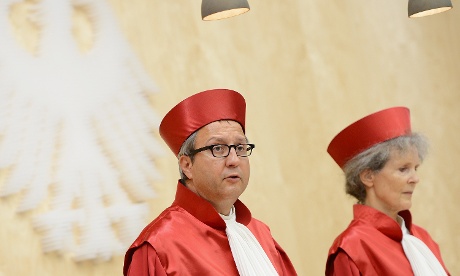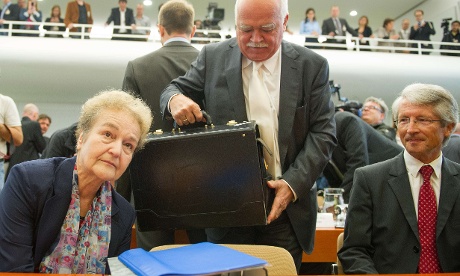The Germans finally catch on to the meaning of European.
German Court Approves Bailout Fund, With Conditions - Eurozone Crisis Live
PHOTOS FROM THE GERMAN COURT
Here are some more photos from this morning's court ruling in Karlsruhe: The president of the German Constitutional Court, Andreas Vosskuhle, reading the verdict:

(Andreas Vosskuhle (left): Photograph: Matthias Hangst/Getty Images)
Here, Peter Gauweiler (in the centre) of the German Christian Social Union arrives at the court. He was one of the people who brought today's complaint, along with Herta Daeubler-Gmelin (on the left).
The group's lawyer Dietrich Murswiek, is on the right.

(Photograph: UWE ANSPACH/AFP/Getty Images)
Read the verdict in English, or German

The German original is here.
The verdict is the same in both, of course: that the European Stability Mechanism does not violate German law, but that Germany's maximum exposure through the bailout fund must be capped at €190bn.
Furthermore, any changes to the ESM must be approved by the Bundestag.
The European Central Bank has fired its magic bullet. By promising “unlimited” purchases of sovereign bonds, Mario Draghi, the ECB’s president, may have kept his pledge to do “whatever it takes” to save the euro. But in rescuing the currency, Mr Draghi’s magic bullet has badly wounded something even more important – democracy in Europe.
As a result of the ECB’s actions, voters from Germany to Spain will increasingly find that crucial decisions about national economic policy can no longer be changed at the ballot box. In Germany, in particular, there is a growing realisation that the ECB, an unelected body that prides itself on its independence from government, has just taken a decision that has profound implications for German taxpayers – but one that they cannot challenge or change.
Previous European bailouts had to be approved by the German parliament and were subject to review by the German courts. Indeed the German supreme court will rule on the constitutionality of the most recent bailout on Wednesday. But the ECB’s decision to accept unlimited bond purchases is immune to such democratic controls. The bank cannot be overruled by the German parliament. And because it is an EU institution, the ECB cannot be checked by the German courts – only by the European Court of Justice.
At the ECB, the president of the German central bank has just one vote – the same as the presidents of the central banks of Malta or Slovenia. Jens Weidmann, the head of the Bundesbank, cast the sole vote against the bond-buying plans.
Angela Merkel, the German chancellor, may well have given tacit consent to the ECB’s actions and one German member of the ECB council voted with the majority. But opinion polls and media comment suggest that Mr Weidmann’s position reflects majority opinion in Germany. After the ECB decision, the Bundesbank issued a statement arguing that the ECB’s plans are “tantamount to financing government by printing banknotes” and “redistribute considerable risks among various countries’ taxpayers”. Translation: the ECB’s action are illegal and dangerous, and German taxpayers could end up with the bill.
Of course, the Germans – above all – have always revered central bank independence. Under normal circumstances, it is a fine tradition. But in the euro crisis, the ECB is suddenly behaving in a way that veers wildly from the Germanic view of prudent central banking.
It is not just Germans who have reason to feel nervous about the democratic implications of what the ECB has done. To access the ECB’s unlimited firepower, the Spanish or Italians would have to agree to “enter a programme” – which sounds unpleasantly like the kind of condition that is laid down for a wayward drug addict. In reality, Madrid or Rome would have to accept International Monetary Fund-style supervision of their national budgets, directed from Brussels and Frankfurt. Such a humiliating and overt loss of national sovereignty, combined with a deep recession, would be the perfect formula to drive voters to the political extremes, as Greece is demonstrating.
Of course, European idealists would argue that talk of a loss of national sovereignty is outmoded. The euro is a pan-European currency so its fate should be decided by European voters and institutions – not by individual nations.
In practice, however, the eurozone crisis is increasingly polarising European politics along national lines. In Italy and Spain there is now something close to a national position – uniting leftist and rightwing parties – against what are regarded as arrogant and self-centred German policies. In Germany, however, there is a left-right consensus that austerity in southern Europe must be the price of bailouts.
So why has Mr Draghi done it? The answer is that he faced a truly hideous dilemma. It was clear that the hundreds of billions of euros committed to European bailout funds have not been enough to ward off the threat of collapsing banks and sovereign defaults across the eurozone. A financial calamity could lead to another Depression, followed by political radicalisation – and a threat to democracy that is much more direct and unsubtle than the menace posed by the ECB.
By contrast, if Spanish and Italian borrowing costs come back under control – and their governments are prodded into making important structural economic reforms – then the ECB’s actions last week could yet be vindicated. Mr Draghi would not only have saved the euro – he would have bought Europe the time it needs to return to growth.
However, a great many things now have to go right simultaneously for Mr Draghi’s plan to work. It is rather more likely that political and economic unhappiness will grow in Europe over the next year – as Germany slips into recession and Italy and Spain (not to speak of Greece) struggle with ever deeper austerity.
If the euro were ever to break up, the direct financial cost to Germany and other creditor nations – and the resulting backlash – could also be much higher, because of the ECB’s bond-buying programme. Certainly, for anyone with a sense of history, the sight of the German representative on the ECB being isolated and outvoted should be chilling. Since 1945, the central idea of the European project was never again to leave a powerful and aggrieved Germany isolated at the centre of Europe. We are now dangerously close to that point.
gideon.rachman@ft.com

























 By Gideon Rachman
By Gideon Rachman






2 comments:
You vill shtarve your people if necessary so as not to burden the rest of us up here in Stuttgart mitt debt.
Und vhen you haf finished shtarving, you vill parse this sentence from the German judiciary:
"The provision under Article 8 paragraph 5 sentence 1 of the Treaty establishing the European Stability Mechanism limits the amount of all payment obligations arising to the Federal Republic of Germany from this Treaty to the amount stipulated in Annex II to the Treaty in the sense that no provision of this Treaty may be interpreted in a way that establishes higher payment obligations for the Federal Republic of Germany without the agreement of the German representative; "
As you can see, ve haf ways to make you suffer.
Crankily yours,
The New York Crank
If you can read.
Luff ya!
S
Post a Comment